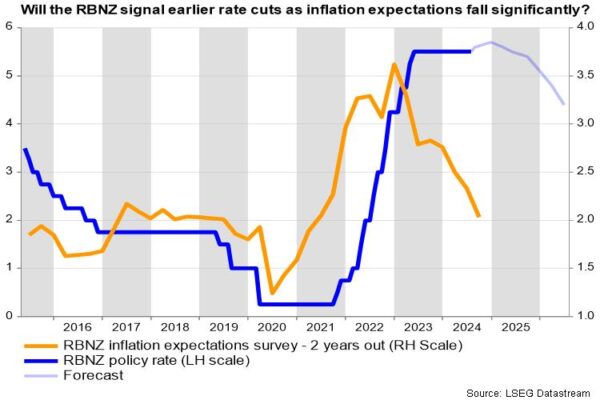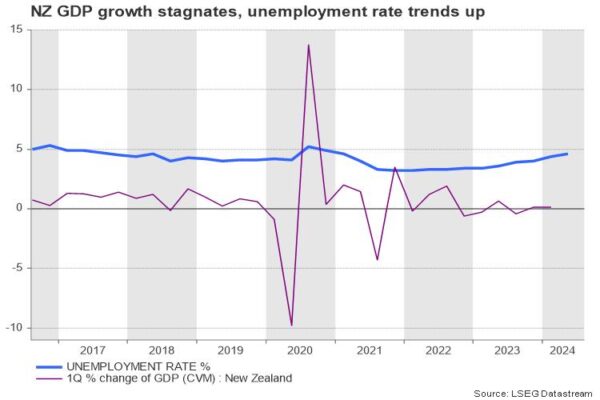- RBNZ could keep interest rates steady but signal easing sooner rather than later
- Economic picture shows signs of stress but no red flags yet
- NZDUSD approaches 0.6060-0.6080 resistance territory
NZ employment data sway rate cut bets
Q2 employment data from New Zealand exceeded the forecasts, leading to a reevaluation of rate cut expectations and a subsequent bullish movement in NZDUSD. However, the odds have since increased and now strongly indicate a 25bps rate reduction. Market pricing also implies two more similar rate reductions by year-end.
On the other hand, analysts believe that interest rates will remain steady at 5.5% and they might be right as inflation has yet to sustainably reach the RBNZ’s target of 1-3%, and strikingly is still hanging some distance above the 2.0% midpoint target. Non-tradable inflation, which includes housing and construction costs has barely slowed down, standing way higher at 5.4%.
Yet, a rate cut this month could be justified, or at least it could be a close call for lower interest rates to come in sooner rather than later. A survey conducted by the central bank showed inflation expectations from one- to ten-year timeframes falling markedly, with the two-year measure, which is closely monitored by the RBNZ, converging towards the 2.0% target from 2.33% previously. Opinions also showed optimism that the battle against inflation has been won.

Macro data raise the odds for a rate cut sooner than later
Separately, quarterly GDP data returned to growth in the three months to March, albeit at a pale pace of 0.2%, staying below pre-pandemic levels. Discouragingly, the manufacturing sector suffered the most since 2021 in July according to PMI data and the latest update from the services sector was disappointing as well.
As regards the labor market, despite the positive surprise in the Q2 figures, the unemployment rate continued to trend higher for the fifth consecutive quarter, climbing to the highest in three years. Additionally, although there was an unexpected quarterly rise in wage growth, the annual rate fell to its lowest point in two years at 3.6%, while working hours decreased by 1.2% q/q. By mid-2025, the RBNZ foresees a sustained rise in the unemployment rate to 5.1%.
Market reaction
The next inflation and employment update will be in October and November respectively, which makes someone wonder if the RBNZ has enough patience to wait till the end of the year before easing policy as talks for a bold 50bps rate reduction in September heat up in the US. One possible initial action for policymakers could be to modify their narrative of “higher for longer” stated in May’s statement and/or move up the timeline of rate cuts to 2024 from the previously projected March 2025.

Steady interest rates or a 25bps rate cut accompanied by signals of more aggressive rate easing in the coming meetings could weigh on NZDUSD, pressing the pair towards 0.5900 if the 20-day simple moving average (SMA) proves fragile. Even lower the door would open for the double bottom area of 0.5850.
In the opposite scenario that the central bank maintains a hawkish tone due to the stickiness in non-tradable inflation, keeping interest rates steady for now and flagging fewer rate cuts by year-end than anticipated by investors, the pair could rise to re-challenge its 50- and 200-day SMAs within the 0.6060-6080 area. Even higher, the bulls might fight the critical resistance zone of 0.6147-0.6173.
Note that US CPI and retail sales data are also on the agenda this week and could fuel extra volatility in the markets.










